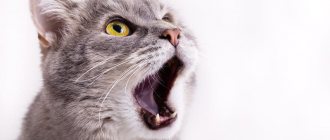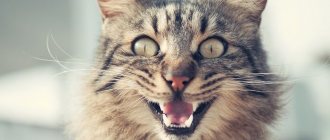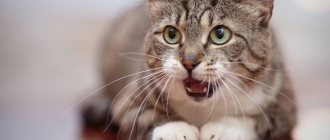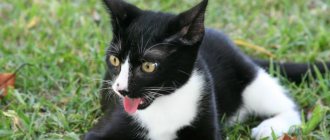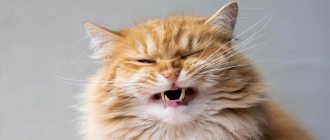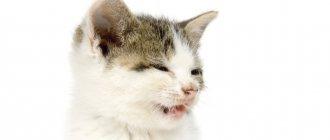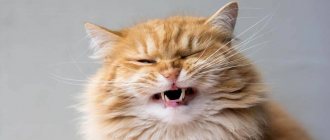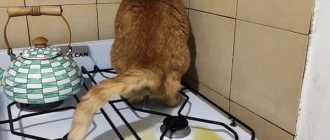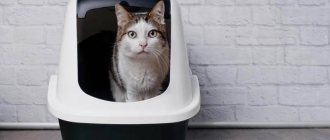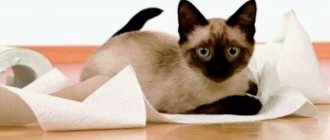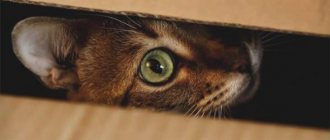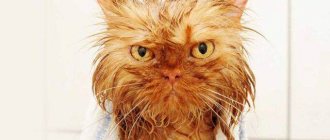The tongue is a functional muscle with which a cat washes itself, eats, and drinks. The animal is characterized by nasal breathing: passing through the nostrils, the air is heated, filtered and enters the body free of dust and germs. Sometimes owners notice that the cat breathes like a dog with its tongue hanging out. What are the reasons? When is such behavior considered normal, and when is it considered pathological?
Physiological norm
It is normal for a cat to walk with its tongue hanging out in the heat, when under stress, during childbirth, and in some other situations.
Heat
The body of domestic animals is covered with thick hair, and they have significantly fewer sweat glands than humans. In hot weather, body temperature rises, especially during periods of activity. It is difficult for the body to maintain it at a comfortable level - thermoregulation is facilitated by the tongue. Moisture from its surface evaporates, body temperature gradually decreases.
Overheating can be determined by indirect symptoms:
- intensive eye hydration;
- outflow of saliva;
- looking for a cool place.
Owners should turn on the air conditioner or move their pet to a cool room with fresh air to avoid overheating and heatstroke.
Powerful emotions
Experiences and strong emotions are a common cause of changes in behavior. A stressed animal licks its lips, opens its mouth and breathes rapidly. Cats in this state will stick out their tongues and drool. Increased salivation is typical for males due to physiology.
The reaction to stress is considered natural: as soon as the pet calms down, it will hide its tongue. The saliva will also disappear. Owners can speed up the process by picking up the animal and lightly stroking its fur.
Relaxation
There is no cause for concern if your cat sleeps with its tongue hanging out. He is in good shape almost around the clock, but in deep sleep the animal relaxes, does not react to what is happening around him, and does not hear anything.
The tongue also relaxes and increases slightly in length, so the tip protrudes beyond the mouth. This often happens in breeds with shortened muzzles or malocclusions. There is no threat to health.
Interesting fact. In the wild, there are hardly any individuals capable of completely relaxing - danger can lurk everywhere, so animals are always on the alert and do not lose their vigilance. Sound sleep is the privilege of domesticated animals that are not in danger.
Passion
Pets remember their owners' gestures and use them when they are in dire need of communication. They show the tip of their tongue, imitating a smile and attracting the attention of their owners.
Adults, reaching puberty, stick it out, flirting with the opposite sex. Males behave this way when they smell a female.
Professional opinion
An interview with an English veterinarian was recently published on YouTube, who urged people not to abuse cats and to pay utmost attention to the health of a pet if it sticks out its tongue. This appeal concerned fans of videos in which cats stick out their tongues at the sound of tape. The veterinarian talks about the nervous reactions, disorders and experiences of the animal during this fun.
The doctor admitted that, as a veterinary university applicant, he met a charming, short-legged cat whose tongue always stuck out. The veterinarian’s first emotions were associated with tenderness, since the cat had huge, round eyes and a flattened nose. Years later, having already become a graduate, the man understood what exactly the pathology was pointing to, but he never managed to meet that same sweet cat again.
Perhaps this specialist is wrong about a particular cat. Perhaps the touching video that blew up the Internet did not cause any harm to her hero, but all animals are individual. There are hundreds of videos in which cats make grimaces when they are scratched, stick out their tongues at the sound of a comb, walk on their hind legs, scream in a voice that is not their own, and it all looks funny.
All responsible owners can be given only one piece of advice - make sure that your pet is healthy and only then be touched . There is a very simple example, again a video, where a cat rears up and walks away from the frame sideways on two legs. Millions laughed at this video, but very authoritative professionals immediately determined that the cat was in a pre-infarction state, and this is no longer funny, right?
Pathological conditions
Does your cat have rapid and heavy breathing, does her tongue stick out, does she gasp for air greedily? The listed symptoms are typical for oxygen starvation. Fleeing from it, the animal instinctively swallows more air. Prolonged hypoxia is detrimental to his health.
There are other pathological conditions accompanied by similar symptoms:
- Foreign body. Getting into the respiratory system with food or during play, it limits or blocks the access of air to the lungs and internal organs.
- Ulcers, inflammation, and other damage to the mucous membrane of the larynx.
- Cold, viral infection. During illness, mucus accumulates in the nose and throat, making normal breathing difficult.
- With pneumonia, swelling or injury to the lungs, or pulmonary failure, breathing is difficult. Pulmonary pathologies are dangerous due to their rapid progression and possible death. There is a high risk that the pet will fall into a coma and not come out of it.
- A domestic cat periodically sits with its tongue hanging out and breathes with an open mouth if injured ribs are compressing the lungs. Due to compression, the volume of the lungs decreases - the body feels an acute lack of oxygen.
- Brain pathologies, traumatic brain injuries, intoxication, heart and vascular diseases.
Heart failure
Heart failure is a serious pathology that requires urgent consultation and treatment at a veterinary clinic. The group of cardiac pathologies includes:
- hypertension;
- hypotension;
- angina pectoris;
- cardiac ischemia.
A predisposition to heart pathologies exists in representatives of the following breeds:
- Maine Coon;
- Scottish lop-eared;
- sphinx;
- Abyssinian;
- Cornish Rex.
It is important for their owners not to miss the first symptoms of the disease, among which is a protruding tongue. If this is accompanied by rapid “dog breathing”, lethargy and impotence, there is cause for concern.
Inhalations accompanied by pain, irregular rhythm and cyanosis of the mucous membranes are symptoms that require immediate medical attention.
Poisoning
Intoxication of the body is often accompanied by disruptions in the functioning of the respiratory system and heart. Toxic substances relax the muscles so much that the animal cannot control them. For this reason, the cat's tongue hangs out.
Poisoning can be determined by the accompanying symptoms:
- spasm;
- vomit;
- foam at mouth;
- shaky movements.
Respiratory failure
Respiratory failure accompanies many serious pathologies. You can diagnose it yourself by wheezing, jerky inhalations and exhalations, and intermittent breathing.
An animal without qualified assistance may suffocate.
Physiological reasons: why a cat sticks out the tip of its tongue
As a result of long-term experiments, cat breeds were developed whose distinctive features are the flat structure of the muzzle (brachyceval). Cats whose nose is much shorter than normal are considered flat-faced. They have a wide head and a flattened front of the skull.
Due to genetic changes, the bite of flat-faced animals has become unnatural. These include: the famous Persian breed, Scottish, British.
Several years ago in our country there was a real boom in fashion for Persian cats, which are distinguished by their characteristic flattened muzzle, long hair and large, expressive eyes.
The flat structure of the muzzle has led to the fact that the Persian's tongue often does not fit behind the teeth, protruding slightly forward. Therefore, she is forced to constantly stick out part of the tip. A pet with this feature is not recommended for breeding; its owner must carefully monitor the health of the capricious individual.
If a cat often breathes with its mouth open for no apparent reason, it must be shown to a doctor without fail.Representatives of this breed have congenital heart defects (cardiomyopathy), typical inflammation of the folds of skin above the nose, colds, which also leads to protruding tip.
Currently, the most popular are the British and Scottish cat breeds, which have a short muzzle. They are most often found at exhibitions and in specialized nurseries.
As practice shows, these breeds often have congenital hypertrophic cardiomyopathy, in which the animal breathes heavily with its mouth open and tongue hanging out.
In this case, breathing is accompanied by gurgling, wheezing, and shortness of breath develops. If such symptoms occur, your Briton should contact a veterinarian to identify the disease at an early stage.
Natural "refrigerator"
A cat's tongue is simply indispensable in hot weather.
By licking the surface of the fur coat, the purr reduces the air gap between the skin and the surface of the fur, thereby promoting better cooling of the body. When it becomes completely unbearable, the animal sticks out its tongue and begins to breathe quickly. Moisture evaporating from the surface of the tongue helps further reduce body temperature. Many of us have cats or cats living at home. Some are purebred, some are not. However, for all representatives of the cat family, we take this fact for granted, without even thinking about the nature of this phenomenon. Why do cats have rough tongues? Why do they need such a language and what functions does it perform? Let's answer these questions.
Why is my cat drooling?
- 1 Consider the reasons
- 2 Rabies
- 3 How to treat?
- 4 Prevention
Normal salivation goes unnoticed, because saliva takes part in the process of chewing food and contributes to normal digestion.
But it also happens that saliva is produced in excess and begins to flow from the mouth. Of course, this cannot go unnoticed, besides, if the mouth is slightly open and, in addition to this, the tongue is stuck out.
Let's try to figure out why a cat is drooling, and how dangerous it can be.
Let's consider the reasons
Surely you, or your friends, have had situations when the question arose - why does a cat stick out its tongue and at the same time drool flow from its mouth?
Why might a kitten or adult cat stick out its tongue? It turns out that the reason may be that the animal is hungry and licks itself in anticipation of pleasure. But the drooling will not be profuse, most likely it will last only a few minutes, and after a hearty lunch it will immediately stop. In this case, there is no cause for concern; this is normal.
Another thing is if there is a lot of drooling, it appears regardless of food intake, and the animal itself may experience discomfort. This is how gastritis, hepatitis, stomatitis and other diseases can manifest themselves.
Stomatitis is characterized by bleeding gums and bad breath.
Drooling may occur in kittens with congenital liver disease. If the diet is violated, the symptom intensifies.
The animal could have eaten spoiled food on the street, which was also treated with chemicals. A sharp bone, ointment, or a piece of one's own fur could have gotten into the mouth. However, drooling may occur more than usual as a result of changes in the physiological state, but it can also be a sign of a serious illness.
Rabies
It's not just drool that indicates your pet has rabies. The tongue will be visible from the mouth, foam will appear in the corners, the cat will neither eat nor drink, and will hide from the light, as it causes a burning sensation. An animal may be indifferent to everything that is happening, or on the contrary, it may demonstrate aggression and attack a person.
You need to stay away from a sick animal, reduce contact with it to a minimum and report the incident to the veterinary hospital. You should not touch the animal, as in a state of increased nervous excitability the cat may bite you or scratch you. Then both the animal and its owner will have to be treated.
This is why foamy saliva is a cause for alarm and concern.
How to treat?
Having noticed the signs listed above, you need to try to determine their cause. If everything suggests that the cat is poisoned, give him a sorbent. Every home has activated carbon, in this case it should help. If the oral cavity is injured, take an antiseptic and treat the wound.
A foreign body can be removed from the mouth with sterile tweezers, but before this the oral cavity must be treated with potassium permanganate. If there is no foreign object in the mouth, and the urge to vomit is obvious, the cat should be taken to a veterinary hospital. Only a specialist using instruments can remove a foreign body from the larynx or esophagus.
If there are wounds in the oral cavity, they are lubricated with a preparation called Lugol. You need to do this once a day until they heal.
It happens that it is difficult to independently determine the cause of this condition, then seek help from a veterinary hospital. After examining the patient, the doctor will rule out life-threatening pathologies and, if necessary, recommend treatment and make recommendations. If you do not respond in time to a protruding tongue and excessive salivation, then you can waste time, and the treatment will be longer and more persistent.
Prevention
Your pet should be examined regularly, including its oral cavity. When using sprays to control fleas or ticks, you must first carefully read the instructions and then apply the substance to the cat’s withers.
Rat poisons, mice control products, preparations to control insects, garden pests, household chemicals - all this should be stored out of the reach of cats. After all, everyone knows that poisons should be kept away from children, but the fact that pets are curious, as children, unfortunately, often forget.
Oral problems
Unfortunately, a cat does not always stick out its tongue for harmless reasons. This may be a symptom of oral pathologies or jaw dysfunction. Among them:
- fracture, bruise or dislocation of the jaw bone;
- dental diseases (gingivitis, periodontal disease, stomatitis), in which the tongue swells, the cat experiences pain and tries to alleviate its condition by sticking it out;
- various tumors located in the oral cavity.
Ulcers, cracks and other lesions of the mucous membrane may be of a secondary nature. That is, it is a symptom of organ diseases that have nothing to do with the oral cavity. For example, acute renal failure, uremia, serious viral infection. If a cat suddenly begins to stick out its tongue, while the mucous membrane in its mouth is damaged, the situation cannot be left unattended. Veterinarian assistance is needed.
Pathology
When, for no apparent reason , a cat breathes with his tongue hanging out, this may be a sign of the following disorders in the body.
- Pulmonary pathologies: pneumonia, pulmonary edema, degeneration of lung tissue, lung injury, impaired blood flow in the pulmonary circle.
- Diseases of the nervous system: traumatic brain injuries, inflammation in the meninges, tumors, drug poisoning.
- Muscle dysfunction: muscle weakness, rupture of the diaphragm due to injury, poisoning with drugs that cause muscle relaxation.
- Chest injuries: punctures, foreign objects (rubber bullets).
- Heart failure: drop in blood pressure, ischemia, angina. There is a breed predisposition to heart disease. These diseases often affect cats of the Cornish Rex, May Coon, Scottish Fold, Oriental, Sphynx and Abyssinian breeds.
- Poisoning. Many toxins cause cardiac and respiratory problems. Nerve poisons attack the muscles, causing weakness and a drooping tongue. As a rule, poisoning is accompanied by vomiting, foam at the mouth, convulsions or loss of coordination of movements.
Respiratory failure occurs instantly, acutely and chronically. It can end tragically - the animal falls into a coma and dies from lack of oxygen.
If your cat's heavy breathing is accompanied by pain, difficulty breathing, irregular breathing rhythm, or cyanosis of the mucous membranes, then immediately take your pet to the clinic for veterinary care.
Treatment and its features
To choose medical or surgical treatment, it is necessary to understand why the dog is breathing frequently and make a diagnosis. The lungs and heart are examined first. Abnormalities are monitored using ultrasound, x-ray, ECG and MRI. Changes in baseline indicators are checked using the results of a blood test. Depending on the complexity of the identified pathology, treatment is carried out inpatiently or at home.
Contacting the clinic
In the clinic, doctors help remove stuck objects and eliminate the consequences of fractures. If there is a lack of oxygen, the animal is put on an oxygen mask or placed in an oxygen chamber.
If ascites is detected, the accumulated fluid is removed through a puncture in the abdominal area. You cannot do without a hospital even in case of poisoning. The poisoned pet is given an antidote and placed on a drip. After the dangerous symptoms have been eliminated and the dog’s condition has stabilized, the dog is sent home under the supervision of the owner.
Therapy at home
Strictly follow the treatment recommendations issued by your veterinarian. Do not deviate from the indicated regimen and do not use other drugs.
The choice of medications depends on the disease found. These may be antibiotics, anthelmintics, antihistamines or other medications. In addition to the impact on the causative agent of the disease, symptomatic treatment is used aimed at eliminating the symptoms that have arisen. For this purpose, diuretics, antispasmodics, cardiac glycosides, bronchodilators, anti-inflammatory and antipyretic drugs are prescribed. When taking potent medications, immunomodulators, probiotics and hepatoprotectors can be prescribed to restore the functioning of the immune system, intestines and liver.
